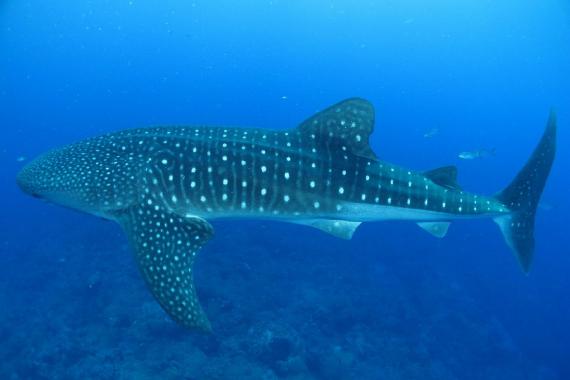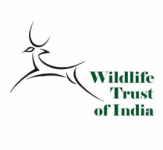The Whale Shark Conservation Project
Current initiative
Published

Whale shark. Image by skeeze via Pixabay
The Whale Shark Conservation Project began in 2004, led by the Wildlife Trust of India (WTI) in a joint venture with the Gujarat Forest Department and Tata Chemicals Ltd. The aim was to encourage the conservation of the whale shark in an area where it had been historically hunted. The project combines awareness campaigns, data collection and conservation incentives to change long held attitudes towards the whale shark and involve local fishermen in their protection. The project has been really successful so far, with a new conservation ethic amongst communities and increased sightings in the area.
The poaching and wildlife trade problem
Species affected Whale Shark Rhincodon typus
Products in tradeWhale Shark fins, liver oil, skin and meat.
Overview of the problem
Whale sharks were once extensively hunted along the shores of Gujarat by locals who would use the whale shark liver oil as waterproofing for their boats. In addition, demand in the 1980s and 90s from international markets for shark fins and meat led to huge declines in the species off the west Indian coast. It is thought that hundreds of whale sharks were killed each year prior to 2000, with fishermen earning between $2,500-$7,000 for each individual. Although the whale shark was listed in 2001 on Schedule I of the Wildlife Protection Act, 1972, the species continued to be hunted, although at a lesser rate.
The anti-IWT initiative
In 2004 the WTI conducted a survey in the coastal town of Veraval and the inland city of Ahmedabad in Gujarat, places known to have high levels of whale shark hunting. The survey revealed low levels of awareness about the protected status of the whale shark amongst local communities. In response, the WTI launched a campaign to create awareness of threats to the species. The project worked alongside a popular local religious leader named Morari Bapu who depicted the whale shark as an incarnate of God and correlated the whale shark with the Indian tradition of ‘Atithi Devo Bhavo’ in which guests are likened to gods and deserve equal respect. This was successful in creating a widespread awareness and fishermen began to release and cut free any whale sharks accidentally caught in their nets.
To incentivise this new behaviour the project began to provide compensation to fishermen whose nets were damaged by whale sharks. To help the fishermen verify damage and claim compensation, the project also distributed over 1000 cameras to document these releases. Plus, to increase local involvement 10-15 fishermen were trained initially in the camera use, after which they went on to train others.
The project reinforces the work done each year with two community events: International Whale Shark Day on August 30th and Gujarat Whale Shark Day, on which the fishermen do not go out to sea. Additional community actions such as a street play devised by volunteers have been undertaken.
Since 2008 the project has also focussed on gathering scientific data to further improve the protection to whale sharks. Activities include photo-identification, migration studies, genetic analysis and the exploration of whale shark tourism.
Inclusion of gender, age and ethnic groups
The project aims to create awareness and change attitudes amongst all members of Gujarat’s coastal communities. Fishermen have been targeted for certain aspects of this project as they were the group historically hunting the whale shark.
The strategy
Increasing incentives for wildlife stewardship
The project has explored options to implement whale shark tourism operations that will provide further incentives to local communities to conserve the species and the wider marine habitat.
Decreasing the costs of living with wildlife
Fisherman are compensated for damaged nets when they set free any whale sharks that are accidentally caught.
Build/and or support sense of community ownership or stewardship
Further detailThe project worked alongside a popular local religious leader and community heads to generate community support and to instil pride in fishermen who protect the species.
Improving education and awareness
Further detailThe project began as an awareness raising campaign and this forms an important part of the project to this day.
Has the initiative made a difference?
Since the implementation of the project there have been 710 documented whale shark rescues from fishing nets. Eight whale sharks have been satellite tagged and there have been recordings of whale shark pups in the area showing that the whale sharks are breeding. Importantly, attitudes have completely changed towards whale sharks, with fishermen turning from hunters to protectors. In addition, the communities have two days a year which are dedicated to the celebration of the species. Finally, the success of the project so far has resulted in plans to extend the project along India’s west coast.
What works and why
The project leaders acknowledge that the involvement of the local religious leader as well as community leaders played an important role in the initial interest shown by the local communities. Additionally, handing responsibility over to the fishermen to document the releases made the compensation process more efficient and resulted in less stress on the whale sharks.
Factors for success
Supportive, multi-stakeholder partnerships with a shared vision
Sufficient time investment in building relationships and trust between the initiative and local communities
Effective and trusted community leaders
Transparent and accountable distribution of benefits to local communities
Organisers, donors and partners
The project is a joint venture of WTI, Tata Chemicals Ltd and the Gujarat Forest Department. The project has received support from the Australia-India Council.
For further information contact (peoplenotpoaching@gmail.com).
